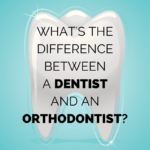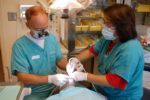Expert Wisdom Teeth Removal: Which Type of Dentist Should You Choose?

Wisdom teeth removal is a common dental procedure that is performed to eliminate the discomfort caused by impacted or infected wisdom teeth. This procedure is usually carried out by a dentist or an oral surgeon, depending on the complexity of the case. However, many patients are often confused about which type of dentist to choose for their wisdom teeth removal. Choosing the right dentist for your wisdom teeth removal is crucial to ensure a successful and comfortable procedure. While both dentists and oral surgeons are qualified to perform this procedure, there are some key differences between the two. Understanding these differences can help you make an informed decision about which type of dentist is right for your needs. In this article, we will explore the differences between dentists and oral surgeons and provide you with expert advice on how to choose the right dentist for your wisdom teeth removal.
Wisdom teeth removal is a common dental procedure that involves extracting the third molars located at the back of the mouth. These teeth typically emerge in the late teens or early twenties, but they can cause dental problems such as overcrowding, impaction, or infection. If left untreated, wisdom teeth can lead to pain, swelling, and damage to nearby teeth and gums. To prevent these issues, many dentists and oral surgeons recommend removing the wisdom teeth before they cause problems. The extraction procedure can be performed under local or general anesthesia, depending on the patient’s needs and preferences. After the surgery, patients may experience some discomfort or swelling, but with proper care and follow-up visits, they can recover fully and enjoy a healthy, pain-free smile.
Choosing the right dentist is crucial for maintaining good oral health, and this is especially true when it comes to wisdom teeth removal. An experienced and skilled dentist can ensure that the procedure is performed safely and with minimal discomfort. Additionally, a reputable dentist can provide valuable advice on how to care for your teeth after the surgery. It’s important to do your research and choose a dentist who has the necessary qualifications and experience to perform wisdom teeth removal. Don’t be afraid to ask for recommendations from friends and family or to read online reviews. Ultimately, the right dentist can make all the difference in your oral health journey.
General Dentists

General dentists, also known as family dentists, are trained professionals who provide a range of dental services to patients of all ages. They are typically the first dental professionals that patients encounter and are responsible for maintaining the overall oral health of their patients. General dentists perform routine dental procedures such as cleanings, fillings, and extractions, as well as providing guidance on proper oral hygiene practices. They can also identify and treat a variety of dental issues, such as gum disease and tooth decay, before they become more serious problems. One of the benefits of visiting a general dentist for wisdom teeth removal is that they are familiar with your oral health history and can provide tailored advice for your specific needs. They can also refer patients to specialists if necessary, such as oral surgeons, for more complex procedures. Additionally, general dentists typically have a strong focus on preventative care, which means that they can help patients avoid future dental issues and maintain healthy teeth and gums for years to come. Overall, choosing a general dentist for wisdom teeth removal can provide patients with a comprehensive and personalized approach to their dental care.
General dentists are dental professionals who provide a broad range of oral healthcare services, including preventative care, diagnosis, and treatment of dental conditions. They are the primary care providers for patients of all ages and work to prevent, diagnose, and treat common dental problems such as cavities, gum disease, and tooth decay. General dentists also perform routine cleanings, take x-rays, and provide education on good oral hygiene practices to help patients maintain healthy teeth and gums. They may refer patients to specialists such as orthodontists or oral surgeons when necessary, but their comprehensive training and experience make them capable of handling most dental procedures. Overall, general dentists play a crucial role in maintaining the oral health of their patients and promoting overall well-being.
Choosing a general dentist for wisdom teeth removal may have both advantages and disadvantages. One advantage is that general dentists are often more accessible and have more affordable rates compared to oral surgeons. They can also perform the procedure in their own office, which may be more convenient for the patient. However, general dentists may not have the specialized training and experience that oral surgeons do, and may not be equipped to handle more complex cases or complications that may arise during the procedure. It’s important to carefully weigh these factors before deciding on a general dentist for wisdom teeth removal.
General dentists are the primary dental care providers who diagnose, treat, and manage overall oral health. They typically hold a bachelor’s degree in dentistry, followed by four years of dental school. After graduation, they must pass a licensing exam to practice in their state. General dentists receive training in all aspects of dentistry, including preventive care, restorative treatments, and cosmetic procedures. Their training also covers the removal of wisdom teeth, although some may choose to specialize in oral surgery. Additionally, general dentists participate in continuing education courses to stay up-to-date with the latest advancements in dentistry. These qualifications and ongoing training provide general dentists with the necessary skills and knowledge to safely and effectively remove wisdom teeth.
Oral Surgeons

Oral surgeons are dental specialists who specialize in performing surgical procedures on the mouth, jaws, and face. They are highly skilled and trained professionals who undergo extensive education and training to become experts in their field. Oral surgeons can perform a wide range of procedures, including wisdom teeth removal, dental implant placement, and corrective jaw surgery, among others. They work closely with other dental professionals to provide comprehensive care to patients with complex dental problems. When it comes to wisdom teeth removal, oral surgeons are often the preferred choice. This is because they have the skills and experience necessary to handle complicated cases and minimize the risk of complications. They can also provide various types of anesthesia, including general anesthesia, to help patients feel comfortable and relaxed during the procedure. Oral surgeons are also trained in managing any complications that may arise during or after surgery, ensuring that patients receive the best possible care and outcomes. Overall, if you need to have your wisdom teeth removed, an oral surgeon is an excellent choice for expert and safe care.
Oral surgeons are dental professionals who specialize in performing surgical procedures on the mouth, teeth, and jaw. They are highly trained and experienced in a variety of surgical techniques, including wisdom teeth removal, dental implant placement, and corrective jaw surgery. Oral surgeons typically undergo several years of specialized training beyond dental school, which allows them to provide advanced surgical care to their patients. They work closely with other dental professionals, such as general dentists and orthodontists, to ensure that patients receive the most comprehensive and effective treatment possible. When it comes to wisdom teeth removal, choosing an oral surgeon can provide peace of mind and the highest level of care.
Choosing an oral surgeon for wisdom teeth removal may have both advantages and disadvantages. One of the significant advantages of opting for an oral surgeon is their expertise in handling complex extractions and complications during the procedure. As they have specialized training in oral surgery, they may have more experience in handling procedures related to wisdom teeth removal. However, the downside is that their services may be more expensive than a general dentist or a periodontist. Additionally, scheduling appointments with oral surgeons may be more challenging due to their busy schedules. Patients may also need to travel to a different location to receive treatment as they may not have a dental practice nearby. Overall, patients should weigh the pros and cons of choosing an oral surgeon and consider their specific needs before making a final decision.
Oral surgeons are highly qualified dental professionals who specialize in surgical procedures related to the mouth, teeth, and jaw. To become an oral surgeon, individuals must complete extensive education and training, including a four-year undergraduate degree, a four-year dental degree, and a four- to six-year residency program in oral and maxillofacial surgery. During their residency, oral surgeons gain hands-on experience in a variety of procedures, including wisdom teeth extraction, dental implants, and corrective jaw surgery. Additionally, oral surgeons must be licensed by the appropriate governing body in their state or country, ensuring that they meet the highest standards of competency and professionalism. With their advanced training and expertise, oral surgeons are well-equipped to provide safe and effective wisdom teeth removal procedures to their patients.
Periodontists

Periodontists are dental specialists who focus on the prevention, diagnosis, and treatment of gum diseases. They are highly trained in the management of the supporting structures of teeth and in the placement of dental implants. Periodontists are experts in the field of periodontics, which is the study of the tissues that surround and support teeth. These specialists have a deep understanding of the complex interplay between the teeth, gums, and bone and are skilled at identifying and treating a wide range of gum problems. One of the key areas of expertise for periodontists is the treatment of periodontitis, which is a serious and potentially debilitating gum disease. Periodontitis is caused by the buildup of plaque and tartar on the teeth, which leads to inflammation and infection of the gums. If left untreated, periodontitis can cause significant damage to the gums and bone, and can even result in tooth loss. Periodontists are skilled at diagnosing and treating this condition, using a range of techniques including scaling and root planing, gum grafts, and dental implants. With their expertise in this area, periodontists are an excellent choice for patients who are suffering from gum disease and want to preserve their oral health.
Periodontists are dental professionals who specialize in the prevention, diagnosis, and treatment of periodontal disease, as well as perform surgical procedures related to the gums and supporting structures of the teeth. They are trained to identify and treat gum inflammation, bone loss, and other soft tissue problems that can lead to tooth loss if left untreated. Periodontists also perform cosmetic procedures like gum grafting to improve the appearance of the gums. They are highly skilled in performing surgical procedures such as scaling and root planing, which remove plaque and tartar buildup from beneath the gum line. Overall, periodontists are experts in maintaining healthy teeth and gums, and are essential for anyone experiencing gum disease or other related issues.
Choosing a periodontist for wisdom teeth removal has its advantages and disadvantages. On the one hand, periodontists are experts in the treatment of gums and bones that support teeth, which makes them particularly skilled in performing surgical procedures such as wisdom teeth extraction. They are equipped with the latest technology and techniques to ensure that the procedure is performed safely and effectively. However, one of the drawbacks of choosing a periodontist is that they may be more expensive than other dental specialists. Additionally, not all periodontists may have experience in wisdom teeth removal, so it is important to do thorough research and select a periodontist who specializes in this procedure. Ultimately, the decision to choose a periodontist for wisdom teeth removal should be made after careful consideration of the patient’s individual needs and preferences.
Periodontists are dental specialists who specialize in the prevention, diagnosis, and treatment of gum diseases. These dental professionals have advanced knowledge and training in the field of periodontics, which makes them highly qualified to provide expert care for patients with complex oral health issues. To become a periodontist, one must first complete a four-year dental degree program and then complete an additional three years of specialized training in periodontics. During this time, periodontists receive extensive training in the diagnosis and treatment of gum and bone diseases, as well as in the placement of dental implants. In addition to their formal education and training, periodontists must also stay up-to-date with the latest research and techniques in their field to provide the best possible care for their patients.
Choosing the Right Dentist for You

Choosing the right dentist is crucial for maintaining good oral health. It can be challenging to find the right dentist, especially if you have specific needs like wisdom teeth removal. When choosing a dentist, it’s essential to consider factors like experience, qualifications, and reputation. You should also consider their communication skills, as a good dentist should be able to explain procedures and answer your questions clearly. One way to find a suitable dentist is to ask for recommendations from friends or family members. You can also search online for dentists in your area and read reviews from other patients. Additionally, you can check with your insurance provider to see which dentists are in-network. Once you’ve narrowed down your options, you can schedule consultations with the dentists to get a feel for their approach and determine if they’re a good fit for you. By taking the time to research and choose the right dentist, you can feel confident that you’re receiving the best possible care for your oral health needs.
When it comes to wisdom teeth removal, there are several important factors to consider when choosing a dentist. Firstly, it is important to ensure that the dentist is experienced and skilled in performing this procedure, as it can be complex and requires a high level of expertise. Additionally, it is important to consider the dentist’s credentials and qualifications, as well as their reputation within the dental community. The availability of sedation options and aftercare services should also be taken into account, as these can greatly affect the patient’s comfort and recovery. Finally, the cost of the procedure and the dentist’s acceptance of insurance or payment plans should be considered. By taking these factors into account, patients can ensure that they choose a dentist who is capable of providing safe, effective, and affordable wisdom teeth removal.
During the consultation process for wisdom teeth removal, it’s important to ask a variety of questions to ensure you feel confident and comfortable with the procedure and the dentist performing it. Some important questions to consider include asking about the dentist’s experience with wisdom teeth removal, any potential risks or complications associated with the procedure, the type of anesthesia that will be used, and what post-operative care will be required. Additionally, it’s important to ask about the cost of the procedure and whether or not insurance will cover it. By asking these and other important questions, you can make an informed decision about which type of dentist to choose for your wisdom teeth removal and ensure a successful outcome.
Selecting a skilled and experienced dentist for wisdom teeth removal is crucial for ensuring a safe and successful procedure. A dentist with expertise in oral surgery and anesthesia will be able to minimize the pain and discomfort associated with the extraction. Moreover, they can identify and manage any potential complications that may arise during the procedure. A good dentist will also provide clear and concise information about the risks and benefits of the procedure, as well as pre and post-operative instructions to help the patient achieve optimal healing. In addition, choosing the right dentist can provide peace of mind and alleviate any anxiety or fear associated with the procedure. Therefore, it is essential to take the time to research and select a qualified and competent dentist for wisdom teeth removal.
When selecting a dentist for wisdom teeth removal, it is important to consider a few key factors. Firstly, ensure that the dentist is experienced in performing the procedure and has a good track record of success. Additionally, consider the convenience of the location and the availability of the dentist, as well as any costs associated with the procedure. It may also be helpful to read reviews or ask for recommendations from friends or family who have undergone similar procedures. Finally, make sure to communicate openly with the dentist about any concerns or questions you may have, and follow their instructions carefully both before and after the procedure to ensure the best possible outcome.
Conclusion

In conclusion, when it comes to expert wisdom teeth removal, choosing the right type of dentist is crucial. While both oral surgeons and general dentists can perform this procedure, it is important to consider the complexity of the extraction and your individual needs. Oral surgeons have specialized training and experience in performing more complex extractions, while general dentists may be suitable for straightforward cases. Ultimately, it is important to do your research, ask for recommendations, and choose a dentist who you feel comfortable with and who can provide you with the best possible care. By making a well-informed decision, you can ensure a safe and successful wisdom teeth removal experience.







